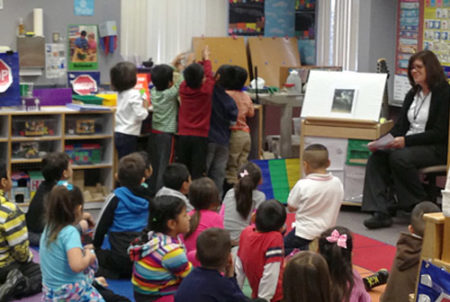On many days throughout the year, you can find students getting into vans for field trips to a variety of exciting destinations. Today, it was teachers and administrators from across the county who loaded into vans to visit a model Transitional Kinder classroom at Antonio Del Buono School in Gilroy, California.
 Transitional kinder ensures that children have pivotal skills, which are foundations to successful learning, when they begin kindergarten. The youngest kids in a kindergarten class risk struggling academically, emotionally and/or socially. At their young age, some may not be practiced in socializing with their peers and teachers, while others may not yet know how to listen or follow a structured class schedule.
Transitional kinder ensures that children have pivotal skills, which are foundations to successful learning, when they begin kindergarten. The youngest kids in a kindergarten class risk struggling academically, emotionally and/or socially. At their young age, some may not be practiced in socializing with their peers and teachers, while others may not yet know how to listen or follow a structured class schedule.
Now offered across the state, transitional kindergarten (TK) is an exciting, new educational opportunity for children born in the fall. TK offers children developmentally appropriate curriculum aligned with kindergarten standards, taught by credentialed teachers from K-12. TK was created by a new California law called the Kindergarten Readiness Act.
Teacher extraordinaire, Janet Londgren, and principal, Velia Codiga, warmly welcomed our group of 20 transitional kinder teachers and school administrators to their school. During our visit, groups were treated to a classroom visit as well as a question and answer period with the principal. What they observed was a wonderfully rich, rigorous, and well managed transitional kinder program with an experienced, nurturing teacher leading the way.
Students in this transitional kinder are exposed to and taught the same standards as kinder students, but they learn the use of more developmentally appropriate strategies which tap into multiple modalities and different styles of learning. A snapshot of what this looked like during our visit included examples such as students learning about clouds through the use of a vaporizer, students singing chants to support learning the alphabet, and students provided with a choice of center activities to do. We also saw small group reading instruction, and hands-on/tactile activities provided at learning centers. Children were also seen independently accessing their class problem-solving binder in order to work out a dispute on their own around sharing toys before seeking out the assistance of teacher.
Santa Cruz teachers came back eager to implement their own transitional kinder classrooms. To support this implementation, teachers spent the afternoon with Linda Brault, WestEd Teaching Pyramid Project Director, who presented on the social emotional foundations of learning, a concept extremely important to the education of our youngest students.
The Kindergarten Readiness Act, signed into law by Gov. Schwarzenegger in 2010, changed the kindergarten entry date from Dec. 2 to Sept. 1 so that children enter kindergarten at age 5. The law phases in the new age requirement by moving the cutoff date one month a year for three years, beginning this fall. Some districts are opting to fully phase in TK in the first year. The law also established transitional kindergarten, a developmentally appropriate grade to serve younger school children with birthdays between September and December.
The entry date change and the creation of TK address a longstanding need in California, as our children have historically started kindergarten at a younger age than kids in almost any other state – often without the maturity, social skills and early academic skills they need to succeed in kindergarten and beyond. At the same time, kindergarten today is far more academic than it once was; similar to what first grade used to be.
To find out more about Transitional Kindergarten in your area, contact your local school district office.
